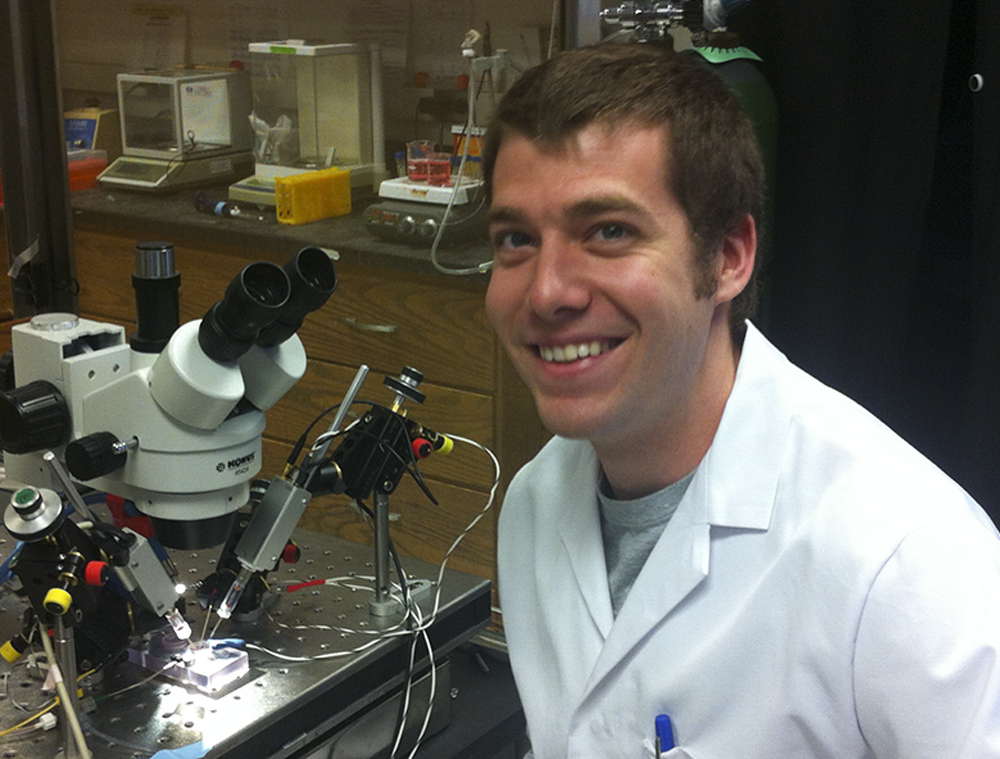Adam Van Dyke, PhD ‘08, CEO of Asulon Therapeutics Inc., compares the current pharmaceutical approach to depression to the approach for strep throat: “For strep,” says Van Dyke, “you go to the doctor and you get a pill that’s effective and starts working immediately. If you go to your doctor suffering from depression, they’ll also give you a pill - like Prozac - but it only works half the time and you won’t know until you take it every day for two to three months. Good luck.”
This conundrum inspired Van Dyke to found Asulon and develop a proprietary small molecule that has potential utility in treating depressive disorders and suicidal ideation. The company’s current molecule circumvents the targets of classical antidepressants and results in an alleviation of depressive symptoms within hours rather than months.
Van Dyke has spent much of his academic career searching for solutions to interesting problems. His interest in neuroscience began at Denison — though he entered with expectations of becoming a psychologist. “While taking a variety of classes, I found that I wanted to be doing something more active than listening to what was troubling patients,” he says. “I became completely engrossed by the whole biology of psychology.”
He credits the Denison faculty with helping him navigate a budding neuroscience field. “The accessibility of the professors and their willingness to give their time was amazing. It was always, ‘Come in, sit down. Let’s chat for a second,’” he says. “I was deeply ingrained in the whole psychology department, essentially living in the fourth floor computer hall. They all knew me by name because I had taken classes with the vast majority of them.”
Susan Kennedy, associate professor of psychology, recalls Van Dyke as a passionate hard worker. “In addition to having Adam in a number of classes, I also had the opportunity to work with him in my lab one summer. It was clear from the beginning that Adam had a love - a passion - for pharmacology, and I’m delighted to see that he has continued with his dedication to the field.”
Van Dyke’s company is built around a promising discovery he made during his PhD studies at the University of Maryland. “I came across a new understanding of the genesis of depression and what it takes to make an effective antidepressant,” he says. From that understanding, Van Dyke developed a novel treatment and began testing it in the lab. The results were extraordinary. “We were able to restore normal behavior in a depressed rat within 24 hours, which was practically unheard of,” says Van Dyke.
When he decided to take his revolutionary discovery out of the lab and turn it into a company, he entered the unfamiliar territory of the business world. But his liberal arts background prepared him to be adaptive. “Being the CEO of a startup, you have to wear many hats,” says Van Dyke. “My ability to adapt to any given situation and take various aspects of my training and apply them to solve problems has given me the flexibility that a more narrowly focused, technical specialist might not have.”
As the company begins to attract more attention from potential funders, Van Dyke has honed his elevator pitch: “We like to think of this as a way to immediately intervene and make a meaningful impact on an at-risk population,” he says. “We’ve done two very impressive things: find a solution for a massive number of people in need and develop a potentially life-saving intervention. What more could we really ask for?”
___________________
Disclaimer: Depression and other mental disorders are complicated and contributed to by environmental experiences and biological influences. Consumers should use caution when faced with the potential of an experimental treatment because of poorly understood short- and/or long-term risks. Effective non-pharmacological treatments for depression exist such as cognitive behavior therapy (CBT) and others. Patients should consult with their physician or other health care professional before starting or changing treatment.






